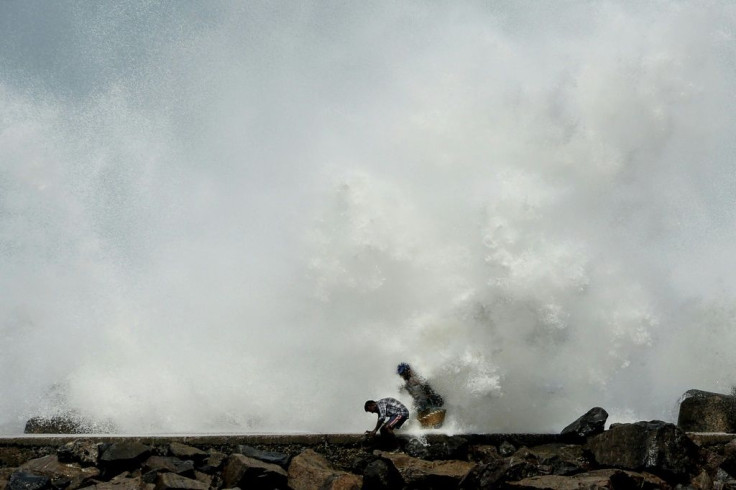Super Cyclone Amphan Slams Into Eastern India, Bangladesh, Refugees In Cox's Bazar Imperiled

KEY POINTS
- Banerjee said she thinks Amphan will be a bigger disaster than the Covid-19 pandemic
- Evacuations have been conducted via social distancing due to the ongoing coronavirus pandemic.
- Some 34 million people in eastern India and another 8 million in Bangladesh are vulnerable to the storm
Super cyclone Amphan, one of the most powerful storms ever recorded in the Bay of Bengal, made landfall on Wednesday, battering the eastern Indian provinces of West Bengal and Odisha.
At least 12 people have been killed, thousands of homes damaged, trees uprooted and embankments breached due to the huge storm surge.
The Indian Meteorological Department predicted that the storm surge could reach up 16 feet in height.
Some 2.6 million people in West Bengal have fled to safety in shelters.
Sanjib Bandyopadhyay, a senior official at the Regional Meteorological Center at Alipore in Kolkata, said wind speeds reached up to 100 miles per hour in some coastal areas of West Bengal, while the capital city of Kolkata was battered by wind speeds of 70 miles per hour.
Weather Underground reported: “Amphan continues to pose a major storm-surge threat to coastal areas of India’s West Bengal province and western Bangladesh. Amphan has been pushing immense amounts of water toward the northern end of the shallow Bay of Bengal since its rapid intensification.”
Southern Bengal was deluged by torrential rainfall as millions of people lost electrical power.
“The trajectory of Amphan is conforming to what we have been forecasting,” said M. Mohapatra, director-general of the India Meteorological Department in New Delhi.
Officials predicted the cyclone will remain over West Bengal until Thursday morning, causing heavy rain and widespread flooding.
“Entire south Bengal is hit. South Bengal is finished. I would request [the government] to provide humanitarian relief and not to engage in any politics,” said West Bengal’s Chief Minister Mamata Banerjee.
Banerjee said she thinks Amphan will be a bigger disaster than the Covid-19 pandemic.
"We are shocked. It will take three to four days to assess the damage," the chief minister said. "The cyclone has affected the electricity supply and destroyed many houses, bridges and embankments.”
According to Banerjee, some 500,000 people have been evacuated to shelters by the state from parts of the coastal area, while Kolkata has had most of its transportation system shut down.
Evacuations have been conducted under terms of social distancing due to the ongoing coronavirus pandemic.
“Cyclone Amphan is a crisis on top of a crisis,” said Pankaj Anand, director of programs and humanitarian response for Oxfam India. “Many of the cyclone evacuation shelters are already being used as coronavirus quarantine centers or housing migrants who have returned to their coastal communities because of [the] lockdown. People are worried there won’t be enough space in the shelters and that they might catch coronavirus in them.”
All told, some 34 million people in eastern India and another 8 million in Bangladesh are vulnerable to the storm.
The cyclone also battered Sundarbans National Park, a huge mangrove forest between West Bengal and Bangladesh’s Hatiya Islands, which is home to 96 protected Bengal tigers and other rare animals. Park officials are watching the tigers to make sure they don’t wander into nearby human settlements.
Amphan is the second strongest storm in the Bay of Bengal since the Odisha super cyclone of 1999, said Mohapatra.
Meanwhile, fears are growing for the safety and well being of 1 million Rohingya refugees in the Cox's Bazar camp in Bangladesh. These refugees, who escaped persecution in neighboring Myanmar, already live in dangerous, squalid conditions – but the cyclone will likely make things worse.
But Refugee Relief and Repatriation Commissioner Mahbub Alam Talukder claimed that Cox's Bazar is ready for Amphan.
"For the cyclone we are prepared. We have tightened the huts of the refugees," he said. "All 32 camps have trained volunteers ready. We have mosques and other learning center[s] if we need to relocate the refugees for safety."
Others are especially fearful for the safety of women and girls living in Cox's Bazar, citing they might become susceptible to rape and violence as security weakens.
“Life could not be more precarious for the nearly half a million women and girls who are already trapped in their homes as well as the children who make up over half of the camp’s residents," said International Rescue Committee's Bangladesh director, Manish Agrawal. "Many of them have experienced gender-based violence, often at the hands of their partners, and now they risk having their homes uprooted to be forced into more condensed spaces… There is a real risk that gender-based violence will increase as the cyclone takes hold.”
© Copyright IBTimes 2024. All rights reserved.





















